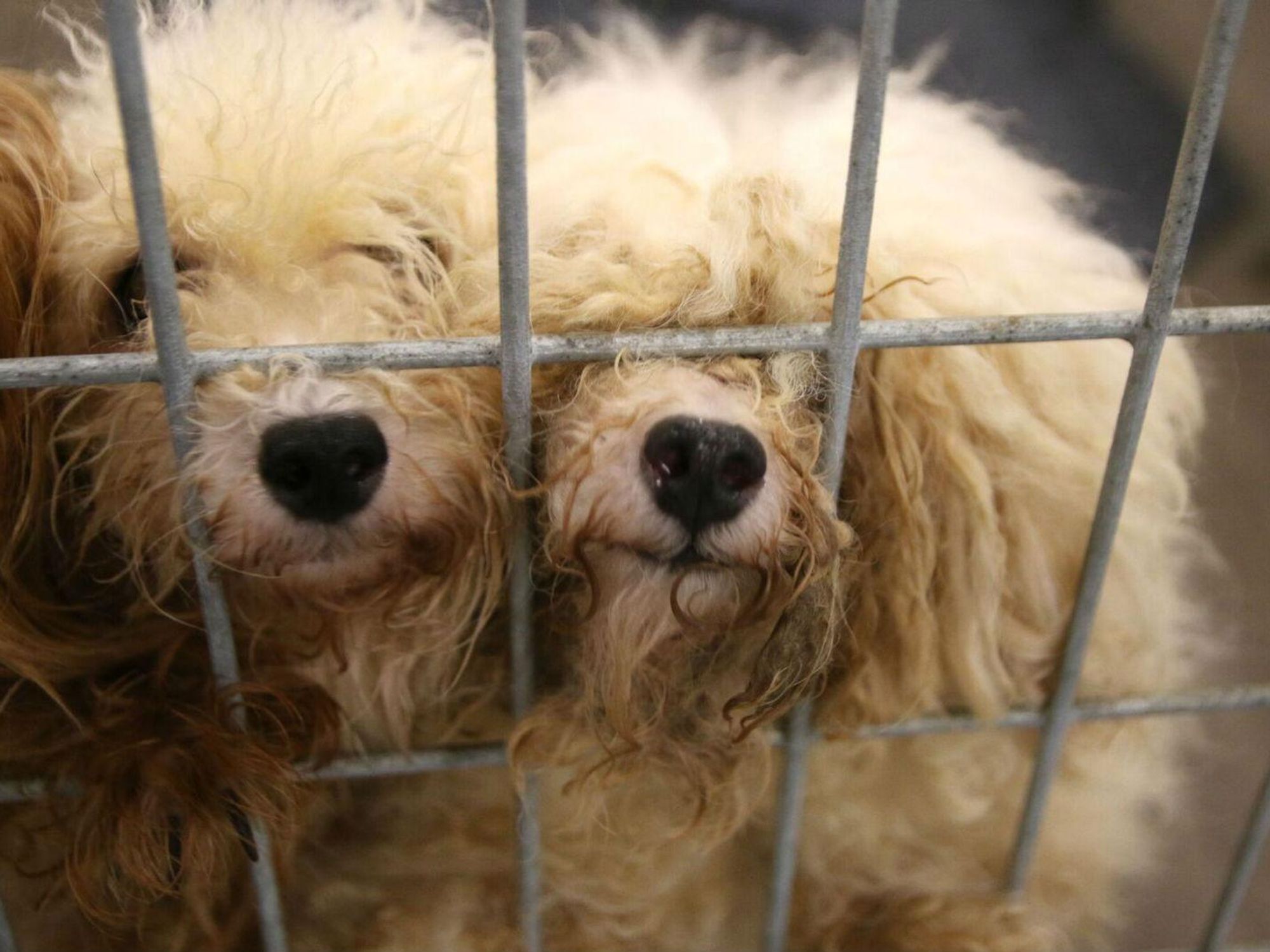Animal News
Texas Attorney General initiates investigation into Petland and puppy mills

Dogs confined in cruel conditions at a puppy mill.
The Texas Office of the Attorney General has initiated an investigation into Petland and its sales of puppy mill animals.
On April 27, the Texas AG office issued a Civil Investigative Demand (CID) related to possible violations of the Texas Deceptive Trade Practices — Consumer Protection Act by Petland, Inc and its franchises.
The CID requests that the Humane Society of the United States (HSUS) provide documentation it has compiled regarding puppy mills across the Midwest that have supplied puppies to Petland, as well as investigations into Petland's practices.
Petland operates nine stores across Texas that sell puppies, and has denied it sells animals from puppy mills. However, HSUS has gathered public records that show the contrary: that Texas Petland stores are buying puppies from facilities where inspectors have found feces piled up in cages, infestations of rodents and cockroaches, and other infractions.
The HSUS has also conducted undercover investigations at two Texas Petland stores in the past, including Frisco and Tyler.
Problems with pet store puppies
First, there's cruelty: Pet store puppies are born into cruel and unsanitary conditions, separated from their mother and littermates at ages too young to be properly socialized.
Then, there's illness: Puppies get trucked across the country, exposed to other stressed and sick puppies, before being placed on a sales floor.
Then, there's cost: The HSUS and government agencies have received complaints from consumers who've bought puppies not knowing they were ill, and were hit with huge veterinary bills and loan payments.
"There've been so many people with sick puppies or that have been harmed by Petland's deceptive practices that the AG's office decided to open this investigation," says John Goodwin, Senior Director of the Stop Puppy Mills Campaign. "They're opening this investigation for the same reason that Dallas and Houston and other major cities have enacted local ordinances. A pet store is one of the worst places to get a dog."
Vet bills
One example cited by the HSUS is a woman named Lovie Langston who bought a puppy at the Bellaire Petland in November 2021. Langston says that Petland deceived her about the cost of the puppy and signed her up for two loans without her knowledge — one from EasyPay Finance with an interest rate of 134 percent.
The puppy was sick at the time of sale and required veterinary care for seizures and other problems for months, before passing away in November 2022. Langston spent thousands on vet care as well as trying to pay off the high-interest loan, and had to move because she could not pay her rent.
Petland & puppy mills
HSUS has documented numerous investigations from 2019 to 2022 of horrendous conditions at puppy mills across the Midwest including Nebraska, Kansas, Oklahoma, Iowa, and Missouri — all of which sold animals to Petland stores across Texas.
Petland stores bought dogs from the following facilities where violations were found:
- At Monroe County Puppies in Madison, Missouri, state inspectors found puppies in an enclosure completely covered with fecal matter, as well as a dog with a noticeable head wound that had not been treated, as well as an abundance of flies.
- At Chris Kauffman, a breeder in Moulton, Iowa, inspectors found enclosures with dogs trying to step around the buildup of feces as well as dogs with untreated eye conditions including one with a mass of “red material” in the center.
- At Mervin & Lizzie Yoder’s facility in Clark, Missouri, inspectors found flooring completely covered with feces, which prevented the animals from being able to avoid sitting or walking in it, as well as repeat violations for a rodent infestation. A dog had matted hair, another had signs of a severe ear infection, and one had a scab on her shoulder the size of a baseball with discharge, plus a dog chained inside an enclosure “because it was fighting with other dogs.”
- At Chris’s Kennel / Horseshoe Lane in McAlester, Oklahoma, a litter of nursing puppies had some puppies that were dead or severely ill and had not been noticed. One puppy was decaying; the other had flies going in and out of its nose. There were rodent droppings around stored food, and fecal-contaminated water. There were cockroaches in the dog food that dogs were eating as well as in the kennels, on the AC units, on the walls, and falling from the ceiling. Dogs from this facility were sold to Petland Frisco.
- Petland Frisco also acquired dogs from Loveable Puppies in Greentop, Missouri, where inspectors encountered an ammonia smell from uncleaned urine so strong it burned their noses. There were dogs without water, a dog with a swollen ear and discharge, dogs with matted coats, an accumulation of feces, two dogs so underweight that their ribs and hip bones were prominent, and an enclosure with puppies so covered in feces that there was no clean area for the puppies to lay.
Bans on puppy mill sales
Six states and more than 450 localities — which includes 15 cities in Texas such as Dallas, Houston, Austin, San Antonio, Fort Worth, The Colony, Waco, Euless, Sherman, Wylie, College Station, Bryan, Pasadena, San Marcos, and Corpus Christi — have all enacted ordinances prohibiting the sale of dogs and cats in pet stores.
Texas is currently considering a statewide ban on selling puppy mill puppies in pet stores. Representative Jared Patterson (R-Frisco) filed HB 870, which would help put an end to puppy mill practices by requiring that pet stores can sell only healthy animals from shelters or rescues.

 Rendering of Halperin ParkCourtesy rendering
Rendering of Halperin ParkCourtesy rendering Rendering of Halperin Park.Courtesy rendering
Rendering of Halperin Park.Courtesy rendering